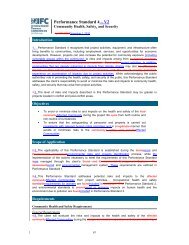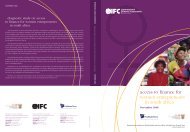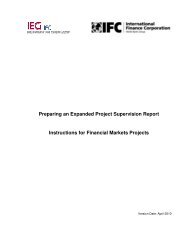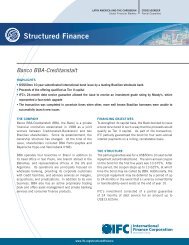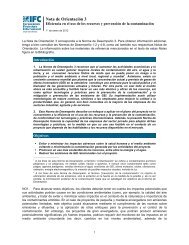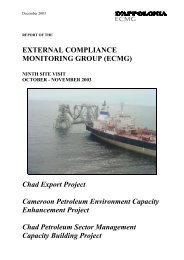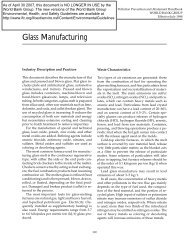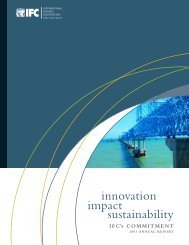Corporate Governance for Banks in Southeast Europe: Policy - IFC
Corporate Governance for Banks in Southeast Europe: Policy - IFC
Corporate Governance for Banks in Southeast Europe: Policy - IFC
Create successful ePaper yourself
Turn your PDF publications into a flip-book with our unique Google optimized e-Paper software.
Brief<strong>in</strong>g of the board: Audit committees should not become gatekeepers. It is good to have the <strong>in</strong>ternal<br />
auditor periodically brief the full board to ensure good communication and not to cloister the <strong>in</strong>ternal auditor<br />
with<strong>in</strong> the conf<strong>in</strong>es of the audit committee. Also, if the audit committees are receiv<strong>in</strong>g brief<strong>in</strong>gs from the<br />
risk managers and compliance people, they should also periodically brief the full board. In any event, the full<br />
board should be discuss<strong>in</strong>g risk and periodically hear from the risk manager, and the risk manager should<br />
have fluid access to the board.<br />
Assessment of statutory audit bodies or “audit councils”: In SEE, it is important to dist<strong>in</strong>guish between<br />
statutory audit bodies required by company law, or so-called audit councils, and an audit committee of the<br />
board. The statutory body typically has a different role and is not a substitute <strong>for</strong> a properly constituted board<br />
committee. In the majority of countries <strong>in</strong> SEE, audit councils can be made up of outsiders, which creates<br />
problems with confidentiality and accountability. At a m<strong>in</strong>imum, the effectiveness of such structures should<br />
be assessed.<br />
Qualifications and <strong>in</strong>dependence: Board committees tend to benefit greatly from specific skills and a<br />
reasonable level of <strong>in</strong>dependence. A majority of <strong>in</strong>dependent members and of members with specific skills<br />
is widely considered a m<strong>in</strong>imum. SEE banks should seek to staff board committees with experienced and<br />
<strong>in</strong>dependent <strong>in</strong>dividuals as needed.<br />
A7. Group structures 37<br />
Group structures are very important <strong>in</strong> the SEE context,<br />
given that the vast majority of bank<strong>in</strong>g activity is<br />
conducted by subsidiaries of <strong>for</strong>eign bank<strong>in</strong>g groups.<br />
In most cases, parent banks come from outside<br />
the region. Though, <strong>in</strong> a few cases, locally owned<br />
banks are parents of regional groups, as with the<br />
Komercijalna Banka ad Beograd. Although the large<br />
presence of <strong>in</strong>ternational bank<strong>in</strong>g groups has brought<br />
improvements <strong>in</strong> bank<strong>in</strong>g and corporate governance<br />
practices, the very high levels of <strong>for</strong>eign ownership have<br />
also raised concerns.<br />
A local subsidiary of a <strong>for</strong>eign bank may not be a<br />
significant operation from a group perspective, yet<br />
a <strong>for</strong>eign subsidiary <strong>in</strong> SEE can easily have a systemic<br />
impact <strong>in</strong> a small country. As was famously described<br />
by Mervyn K<strong>in</strong>g, governor of the Bank of England,<br />
“Global banks are global <strong>in</strong> life, but national <strong>in</strong> death.”<br />
In other words, when th<strong>in</strong>gs go wrong, it is ultimately<br />
the local entity that suffers the consequences and, to a<br />
much lesser extent, the group. By extension, it is local<br />
stakeholders and the local economy that will suffer the<br />
costs of a subsidiary bank failure.<br />
Subsidiary Boards<br />
“There is no way…parents are go<strong>in</strong>g to<br />
want the subsidiary board to come <strong>in</strong> on<br />
issues of strategy and risk. But that does not<br />
mean that directors can…abrogate their<br />
responsibilities. They have…responsibilities<br />
but their position is extraord<strong>in</strong>arily difficult.”<br />
John Plender, United K<strong>in</strong>gdom<br />
“Of course, looked at on a group basis, you<br />
would say, ‘We are responsible as a group.<br />
Here is the brand. We will look after you,’<br />
but when the balloon goes up, [and] the<br />
local regulator…has to sort this mess out…<br />
every legal argument is likely to be raised<br />
that places the responsibility with that local<br />
subsidiary, to the detriment of the public<br />
and the depositors <strong>in</strong> that host country.”<br />
Roger McCormick, United K<strong>in</strong>gdom<br />
37 2010 BIS Pr<strong>in</strong>ciples, Section III.A, pp. 15–16.<br />
<strong>Corporate</strong> <strong>Governance</strong> <strong>for</strong> <strong>Banks</strong> <strong>in</strong> <strong>Southeast</strong> <strong>Europe</strong> <strong>Policy</strong> Brief 29



